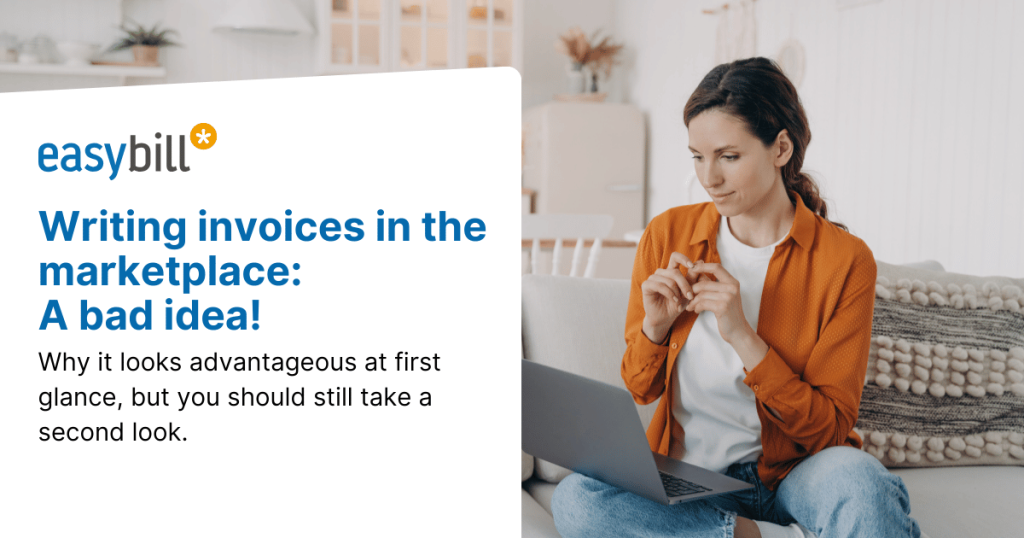
For many entrepreneurs and online retailers, selling on marketplaces such as Amazon, eBay or Etsy is an essential part of their business model. The reach and ease of use of these platforms make it possible to reach new customers and increase sales. However, when it comes to invoicing, you should think carefully about whether you use this function directly via the marketplace. In the following article, we will show you the top 6 areas where it is worth using specialized invoicing software such as easybill instead of using the marketplace for invoicing.
1. Restrictions on flexibility and individuality
Although many marketplaces offer the option of creating invoices, these are often very limited. This applies to both the layout and the content design. You have little to no leeway to adapt your invoices to the individual needs of your company, for example when integrating logos, specific discount codes or individual payment terms.
With invoice software such as easybill, on the other hand, you can customize your invoices, adapt them to your corporate identity and tailor them flexibly to your business requirements. This not only strengthens your professionalism, but also ensures a uniform appearance towards your customers.
2. Lack of conformity with the GoBD
The GoBD (principles for the proper management and storage of books, records and documents in electronic form and for data access) place strict requirements on electronic accounting in Germany. Many marketplaces offer invoice functions, but these often do not fully comply with the GoBD. If you create and store your invoices on a marketplace, you may not have the necessary control over the proper archiving and traceability of your invoices.
3. Lack of integration into your accounting software
Another problem with the use of marketplace invoices is the frequent lack of integration into your existing accounting processes. Transferring data from the marketplaces to your accounting software can be tedious and error-prone. You often have to transfer data manually, which not only costs time but also increases the risk of errors.
The external invoicing software also scores points here: Integrate your marketplace activities seamlessly into your accounting software and synchronize all data almost automatically. This significantly reduces the effort required for accounting and minimizes the risk of errors.
4. No central management of your invoices
If you are active on several marketplaces, it can quickly become confusing to keep track of all your invoices. As each marketplace offers its own invoice function, your invoices are located in different places and are difficult to manage centrally. This can not only jeopardize your overview, but also lead to errors in accounting.
The invoicing software, on the other hand, offers the advantage that you have all invoices, credit notes and other documents stored centrally in one place – regardless of the channel through which the sale was made. You can merge sales data from different sources and have a clear overview of your finances at all times.
5. Limited functions for recurring invoices and subscriptions
If you not only sell one-off products, but also offer subscriptions or recurring services, marketplaces are often not the best solution. They usually do not offer automated processes for recurring invoices. You have to operate manually, which is inefficient and prone to errors.
With easybill in particular, you can create recurring invoices once and have them sent automatically according to your specifications. This saves you valuable time and reduces the risk of important invoices being overlooked. Automated transmission of SEPA direct debits? That’s no problem either, so that you have as little work as possible.
6. The upcoming e-invoicing obligation – for marketplace users in the B2B sector
Another important topic that entrepreneurs and, in particular, marketplace users in the B2B sector need to consider is the upcoming e-invoicing obligation. From 2025, the receipt and transmission of electronic invoices in the B2B sector will be mandatory in Germany. This legal change places additional demands on invoicing, as e-invoices must comply with a specified format that can be automatically processed by the tax authorities. Marketplaces are often not designed to meet these requirements, which can lead to considerable problems in complying with the legal requirements.
Specialized invoicing software such as easybill, on the other hand, is already prepared for these requirements. You can create e-invoices in the prescribed format (e.g. ZUGFeRD) and transmit them securely to your business customers. For marketplace users, this is a decisive advantage in order to be prepared for the e-invoice obligation in good time and avoid fines or delays in payment processing. By switching to a professional solution at an early stage, you can ensure that your accounting remains legally compliant in the future.
Use specialized invoicing software
Even if it seems tempting at first glance to use the invoice function directly via the marketplace, you should consider the long-term disadvantages. Specialized invoicing software such as easybill not only offers you more flexibility and individuality, but also ensures GoBD-compliant accounting, central management of your invoices and better integration into your existing systems.
As an entrepreneur, you should always choose the option that offers you the greatest added value in the long term – and in most cases, this is specialized invoicing software. This gives you more control over your invoices and ensures that your accounting complies with legal requirements.
Read also:
New: Receive e-invoices and enter receipts via AI
One Stop Shop (OSS) – What does that mean?
Also, watch our video on Amazon Business (in german):
Amazon Business-Käufer: Was ist zu beachten? | VCS, VCS lite, IDU



